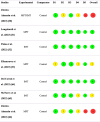rvallee
Senior Member (Voting Rights)
Effectiveness of inspiratory muscle training and multicomponent physical training in patients with post-COVID conditions: a systematic review and meta-analysis

 link.springer.com
BMC Systematic reviews
link.springer.com
BMC Systematic reviews
Abstract
Background
There is evidence that fatigue and dyspnea are among the most frequently reported symptoms of post-COVID condition. Therefore, several studies have investigated respiratory muscle or global peripheral muscle training as strategies to manage those symptoms. Despite evidence of potential benefits, conflicting results persist due to the heterogeneity of rehabilitation protocols and assessment tools. Thereby, the objective of this systematic review was to evaluate the effectiveness of inspiratory muscle training and multicomponent physical training in adults with dyspnea and fatigue for at least 12 weeks after COVID-19.
Method
A search was conducted in September 2024, in the Cochrane Library (Cochrane Central Register of Controlled Trials), EMBASE, PubMed/MEDLINE, PEDro, Lilacs/BVS, Web of Science, Scopus, and Epistemonikos databases. The inclusion criteria were randomized clinical trials published in any language that evaluated the effectiveness of inspiratory muscle training and multicomponent physical training to improve fatigue, dyspnea, and/or physical function in adults with persistent post-COVID symptoms. The risk of bias of the included studies and the certainty of the evidence were assessed using the RoB 2 and GRADE tools, respectively.
Results
After the screening process, seven randomized clinical trials were included. The total number of participants included in the studies was 449. Inspiratory muscle training significantly improved inspiratory muscle strength (maximal inspiratory pressure) (MD = 22.70; 95% CI: 13.78 to 31.62), and cardiopulmonary capacity ( O2max) (MD = 4.49; 95% CI: 3.35 to 5.62). Multicomponent physical training significantly improved the upper and lower body muscle strength through the handgrip strength (MD = 3.05; 95% CI: 1.68 to 4.42), sit-to-stand test (MD = 3.55; 95% CI: 1.61 to 5.49), and timed up and go test (MD = − 1.13; 95% CI: − 1.49 to − 0.77) and the physical functioning were assessed through post-COVID-19 functional scale (MD = − 0.64; 95% CI: − 1.13 to − 0.16) and physical aspects through SF-12 and SF-36 (SMD = 0.72; 95% CI: 0.29 to 1.15). No adverse events were reported among participants in the physical training group, and treatment adherence ranged from 78 to 100%.
Conclusion
Inspiratory muscle training improved cardiorespiratory outcomes, while multicomponent physical training improved muscle strength, physical functioning, and fatigue. Both types of training improve physical functioning. The certainty of evidence for the outcomes evaluated was low.

Effectiveness of inspiratory muscle training and multicomponent physical training in patients with post-COVID conditions: a systematic review and meta-analysis - Systematic Reviews
Background There is evidence that fatigue and dyspnea are among the most frequently reported symptoms of post-COVID condition. Therefore, several studies have investigated respiratory muscle or global peripheral muscle training as strategies to manage those symptoms. Despite evidence of...
Abstract
Background
There is evidence that fatigue and dyspnea are among the most frequently reported symptoms of post-COVID condition. Therefore, several studies have investigated respiratory muscle or global peripheral muscle training as strategies to manage those symptoms. Despite evidence of potential benefits, conflicting results persist due to the heterogeneity of rehabilitation protocols and assessment tools. Thereby, the objective of this systematic review was to evaluate the effectiveness of inspiratory muscle training and multicomponent physical training in adults with dyspnea and fatigue for at least 12 weeks after COVID-19.
Method
A search was conducted in September 2024, in the Cochrane Library (Cochrane Central Register of Controlled Trials), EMBASE, PubMed/MEDLINE, PEDro, Lilacs/BVS, Web of Science, Scopus, and Epistemonikos databases. The inclusion criteria were randomized clinical trials published in any language that evaluated the effectiveness of inspiratory muscle training and multicomponent physical training to improve fatigue, dyspnea, and/or physical function in adults with persistent post-COVID symptoms. The risk of bias of the included studies and the certainty of the evidence were assessed using the RoB 2 and GRADE tools, respectively.
Results
After the screening process, seven randomized clinical trials were included. The total number of participants included in the studies was 449. Inspiratory muscle training significantly improved inspiratory muscle strength (maximal inspiratory pressure) (MD = 22.70; 95% CI: 13.78 to 31.62), and cardiopulmonary capacity ( O2max) (MD = 4.49; 95% CI: 3.35 to 5.62). Multicomponent physical training significantly improved the upper and lower body muscle strength through the handgrip strength (MD = 3.05; 95% CI: 1.68 to 4.42), sit-to-stand test (MD = 3.55; 95% CI: 1.61 to 5.49), and timed up and go test (MD = − 1.13; 95% CI: − 1.49 to − 0.77) and the physical functioning were assessed through post-COVID-19 functional scale (MD = − 0.64; 95% CI: − 1.13 to − 0.16) and physical aspects through SF-12 and SF-36 (SMD = 0.72; 95% CI: 0.29 to 1.15). No adverse events were reported among participants in the physical training group, and treatment adherence ranged from 78 to 100%.
Conclusion
Inspiratory muscle training improved cardiorespiratory outcomes, while multicomponent physical training improved muscle strength, physical functioning, and fatigue. Both types of training improve physical functioning. The certainty of evidence for the outcomes evaluated was low.

